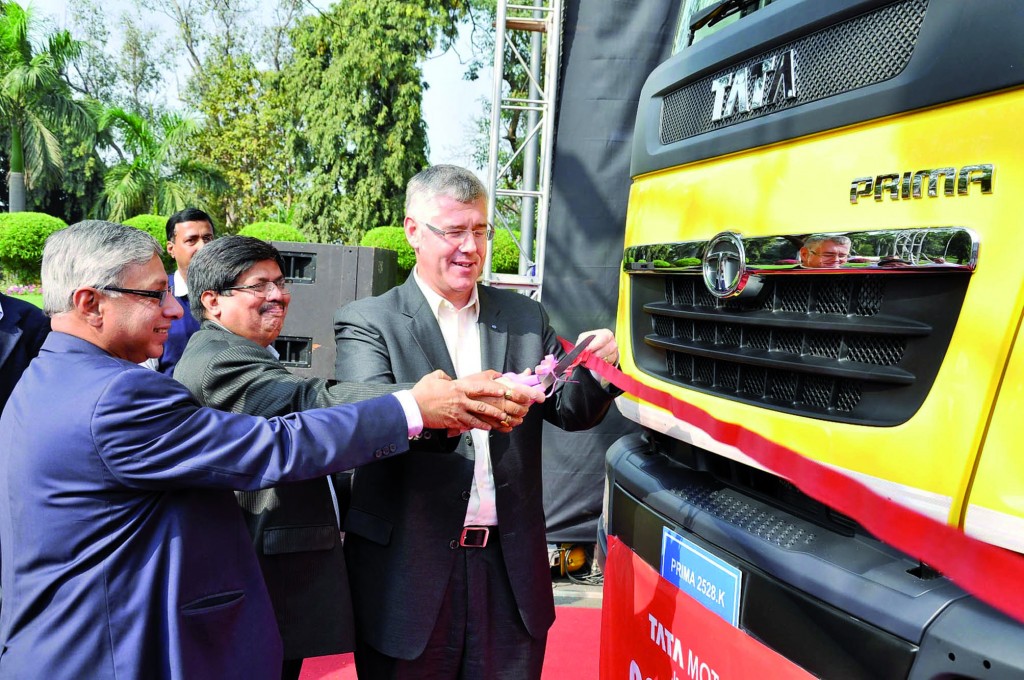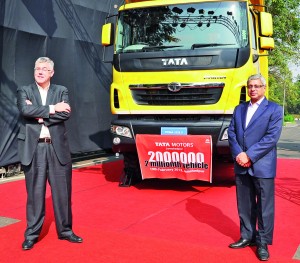
February 19 was a red-letter day for Tata Motors’ world class facility at Jamshedpur with its roll-out of the two millionth truck on that day. The plant manufactures Tata Motors’ entire range of medium and heavy commercial vehicles, including the Tata Prima, both for civilian and defence applications.
Commenting on this milestone, Mr. Karl Slym, Managing Director, Tata Motors, said: “We are proud that the mother plant of the company, from where our operations started, has today released its 2 millionth truck. We have modernised the plant through the years, which today produces our most technologically rich and high performing civilian and defence products, catering to customers across the world.”
With the plant manufacturing over 200 truck variants, ranging from multi-axle trucks, tractor-trailers, tippers, mixers and special application vehicles, the Jamshedpur facility has led the company’s evolution into a manufacturer of global repute. Besides India, these vehicles are sold in South Africa, Russia, Myanmar, the SAARC region and the Middle East.

The Jamshedpur facility was Tata Motors’ first, set up in 1945, to manufacture steam locomotives. It led the company’s foray into commercial vehicles in 1954. It has been modernized on a particularly intense scale in the last 10 years. The plant houses a world class design and engineering centre which is responsible for conceptualisation and integration of Tata Motors’ current and future truck range. The centre undertakes complex digital design through 3D visualization of new truck models, including the special features and electrical systems. It also houses a comprehensive facility for benchmarking, prototype planning, vehicle assembly and chassis fabrication.
The testing unit also includes engine performance testing, indoor and outdoor vehicle testing, noise, vibration and harshness (NVH) testing, durability testing and other performance related developments.
The state-of-the-art engine assembly shop manufactures the Tata 697/497 naturally aspirated and turbo-charged engines, with a capacity of supplying upto 200 engines per day. The truck factory’s main assembly line rolls out one truck every five minutes. The other line is dedicated to special-purpose vehicles and for meeting the requirements of the defence sector. The world-class facility incorporates a flexible approach to manufacturing such that it is ready to respond quickly to changing customer needs.
The fully equipped foundry supplies high-grade SG iron castings and is rated as one of the highly automated foundries in the world. It has a technologically advanced high pressure moulding line, with a rated production capacity of 90 moulds per hour.
As one of the most modern forging set-ups in the country, the company unit produces critical forgings like crankshafts, front axle beams and steering parts for the automobile plant. It has a capacity to forge front axle beams at 90 sec per piece and crankshafts at 120 sec per piece. The forge has been certified to ISO 9002 and QS 9000 by BVQI.
The facility also houses a cab & cowl factory, which is equipped with an automated centralized paint shop with a provision for metallic painting. Centralized trim lines lead to improvement in logistics flow and a shower testing facility in the vehicle dispatch area. It is also equipped with a clean room for CRDI engines, to ensure a dust-free environment for fitment of critical parts, a training division and driver training centre with the latest technologies.
Some key technologies in Tata Motors M&HCV trucks today are anti-lock breaking system (ABS), automatic transmission, enhanced heating, ventilation and air-conditioning (HVAC) systems, telematics for fleet tracking, power steering, motorised headlamps, adjustable telescopic steering systems, cold start, on-board diagnosis, pneumatically suspended seats, keyless entry, light intensity control (for Prima cabin), music system, clutch pedal assist, electronic instrument cluster and other ergo pack features. Electronic stability control (ESC) in tractors and anti-slip regulation (ASR) are new technologies being developed.